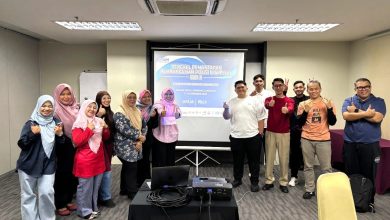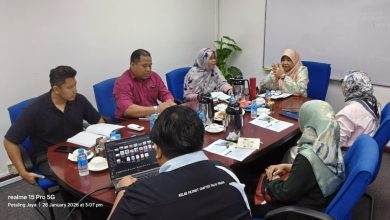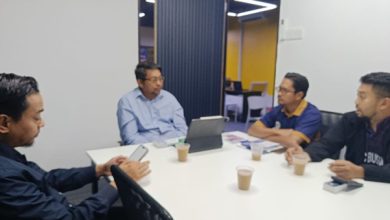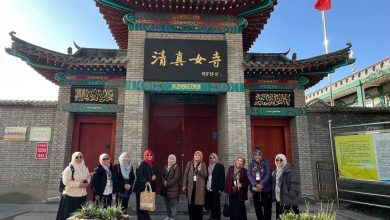ICOCI 2025 Spotlights Global Innovation in AI and Humanity at the Dawn of the Fifth Industrial Revolution
News and photos by ICOCI X Team
MEDAN, 2 July 2025: The 10th International Conference on Computing and Informatics (ICOCI 2025), hosted by the School of Computing, Universiti Utara Malaysia (UUM), brought together delegates from 12 countries in a gathering focused on aligning artificial intelligence (AI) and digital technologies with human values and ethical responsibility.
Held in Medan, Indonesia, the conference carried the theme “Beyond Binary: AI, Humanity, and the Dawn of IR 5.0”, marking a decade-long journey of international collaboration and research excellence.
Organised by UUM’s School of Computing in partnership with Universitas Islam Negeri Sumatera Utara (UINSU), Universitas Islam Negeri Sunan Gunung Djati Bandung, and the University of Technology and Applied Sciences, Oman, ICOCI 2025 reaffirmed its standing as a platform not only for academic enrichment but also for nurturing long-term international cooperation.
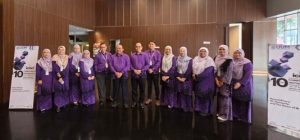
“ICOCI is more than a conference. It is a platform for building lasting academic relationships, for sharing research that matters, and for nurturing a spirit of global cooperation,” said Assoc. Prof. Ts. Dr. Norliza Katuk, ICOCI 2025 Conference Chair, as she reflected on the conference’s legacy and evolving mission.
Having been instrumental in leading the conference since its inaugural edition in 2006, Dr. Norliza described this year’s return to Indonesia as both meaningful and symbolic, reinforcing regional ties and promoting cross-cultural academic ties. Since its inception, ICOCI has been hosted in diverse locations, including Kuala Lumpur, Malaysia (2006, 2009, 2017, 2023); Bandung, Indonesia (2011); Kuching, Malaysia (2013); Istanbul, Türkiye (2015); Bangkok, Thailand (2019); and, due to global travel restrictions, as a virtual edition in 2021.
The conference received 84 submissions, of which 66 high-quality, peer-reviewed papers were accepted. Contributions hailed from Malaysia, Indonesia, Oman, Libya, Iraq, the United Kingdom, China, Saudi Arabia, Nigeria, Jordan, Tunisia, and Türkiye. Topics ranged from AI in education and healthcare applications to smart cities and innovations in machine learning, the Internet of Things (IoT), and human-computer interaction.
UUM Vice-Chancellor Professor Dato’ Dr. Mohd Foad Sakdan emphasised the role of values-based innovation in today’s digital age. “We must appreciate technology—not abuse it. It should be used to empower, not divide. As we innovate, let us do so with empathy and responsibility,” he remarked during his welcoming speech.
The conference also marked a milestone in UUM’s regional collaboration. Four papers co-authored by researchers from UUM and UINSU were presented, the result of a structured mentorship programme aimed at strengthening research capacity and fostering academic growth across institutions.
In her welcoming address, UINSU Rector, Prof. Dr. Hj. Nurhayati, highlighted UINSU’s growing global footprint and its strategic partnership with UUM. “This conference reflects our collective mission to develop technologies that uphold human dignity, ethics, and values. Our collaboration spans education, research, and community empowerment—and we are optimistic about future initiatives in AI curriculum development and ethical innovation,” she said.
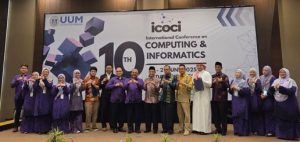
Also contributing to the international agenda was Prof. Dr. Osman Ghazali, Dean of the School of Computing and Assistant Vice-Chancellor at UUM’s College of Arts and Sciences (CAS), who emphasised the importance of research that benefits communities. “Emerging technologies are no longer distant frontiers—they are now central to our daily lives. At the School of Computing, we believe that innovation must result in real-world solutions that empower communities, improve lives, and promote responsible use of technology,” he said.
Echoing this sentiment, Dr. Zulham, Dean of the Faculty of Science and Technology at UINSU, stressed that the depth and strategic importance of institutional partnership between UUM and UINSU. “This collaboration is not symbolic, it is strategic. From visiting lectures to joint publications, it is already enhancing academic quality and global competitiveness. We are now working toward double-degree programmes, curriculum innovation, and even a joint research centre focused on AI and Ethics,” he said. He encouraged participants to see the conference as a launchpad for long-term academic partnerships.
The event also witnessed the signing of several Memoranda of Understanding (MoUs) between UUM and its institutional partners, including UINSU, Universitas Islam Sumatera Utara, Universitas Sangga Buana and Universitas Syiah Kuala, setting the foundation for future collaborations in research, postgraduate programmes, and academic mobility.
With representation from across Southeast Asia, the Middle East, Europe, and Africa, ICOCI 2025 exemplified not only scholarly diversity but also a shared commitment to leveraging technology in ways that uphold human dignity and global well-being.
Since its inception in 2006, ICOCI has evolved into a highly regarded international forum. It continues to support research aligned with the United Nations Sustainable Development Goals (SDGs) particularly in promoting quality education, responsible innovation, and global partnerships.
🔗 To learn more about the conference and access the programme book, visit:
https://soc.uum.edu.my/icoci/2025/


